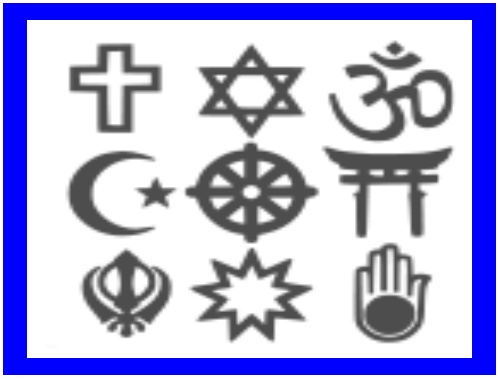[See our Disclaimers page about relying on this website’s contents.]
In our most recent blog, “Plans for Final Illness, Death, and Human Remains Disposition,” we mentioned issues that affect people’s choices about health care in final illness, death, and disposition of their bodies, including a few brief references to spiritual issues. We are expanding that topic in this article as we reflect on a lecture by estate and trust lawyer Martin M. Shenkman at the 42nd Annual Notre Dame® Tax & Estate Planning Institute in South Bend, Indiana, entitled, “Religion and Estate Planning.”
These statements in Mr. Shenkman’s presentation outline struck a familiar chord with us:
“There have been too many family tragedies that could have been avoided with a modicum of advance planning. Fist fights have occurred at funerals over which religious customs to observe. Families have fractured forever over an issue such as which cemetery a parent should be buried in. Intermarried couples that grew up with different faiths, but have not arranged ahead of time to be buried in nonsectarian cemeteries, leave their heirs with Solomon-like choices to make at a very difficult time.”
“With the dynamics of the current society, it has become commonplace for parents to be of different religious denominations from their children, and even from each other. A common scenario is for a client who was adamant about her lack of religious beliefs and feelings, does an abrupt change as she approaches the end of life. It is not unusual for someone, through a progressing illness, to find solace in re-connecting to the religious roots with which she was raised.”
Mr. Shenkman recommended that people make letters of instruction to the family members that express important religious convictions on subjects like:
- What is defined as death? This has been a vital issue in many highly publicized cases and is fraught with controversy and complexity. Specifying specific beliefs about this.
- Can your agent ever withhold nutrition and hydration without violating your religious precepts?
- Does quality of life have any relevance in light of your personal religious beliefs? Define with detail what quality of life might suffice to justify heroic measures even if you are terminally ill. Different religions, and different levels of observance within any particular religion, can have significant impact on this.
- Must certain medical procedures be avoided?
- Can your organs be donated? In some faiths, this is linked to the definition of death.
- What of funeral and burial customs? This is often an emotional issue so that addressing it with clear guidance is very important. Further, custom and tradition often clarifies, or even modifies religious precepts, so providing clarity to this issue is especially important.
- Should maximum pain relief be tempered to preserve some consciousness to enable you to partake in end of life rituals?
- If you do not want religious considerations addressed it is just as important to specify that as well. There is no assurance what your family might believe is appropriate. You must specify your own feelings and beliefs.
- What religious or non-religious end of life requests do you have?
- What type of memorial or monument, if any, should be used.
- Should you be informed, or not, of all medical conditions. Some faiths may restrict the need for full disclosure, especially if the disclosure would negatively impact your health.
Family and friends may not know or share a person’s spiritual convictions about end-of-life medical care and treatment of the person’s body after death, and the person cannot defend such convictions in those circumstances. A spiritually sensitive estate planning lawyer wants to help each client express spiritual convictions, consider who might interfere with the client’s preferences, and plan safeguards to minimize or prevent such interference.
Jeff R. Hawkins and Jennifer J. Hawkins are Trust & Estate Specialty Board Certified Indiana Trust & Estate Lawyers and active members of the Indiana State Bar Association and National Academy of Elder Law Attorneys. Both lawyers are admitted to practice law in Indiana, and Jeff Hawkins is admitted to practice law in Illinois. Jeff is also a registered civil mediator, a Fellow of the American College of Trust and Estate Counsel and the Indiana Bar Foundation; a member of the Illinois State Bar Association and the Indiana Association of Mediators; and he was the 2014-15 President of the Indiana State Bar Association.
Find more information about these and other topics at www.HawkinsLaw.com, add us to your Google+ circles, like us on Facebook, follow us on Twitter @HawkinsLawPC or call us at 812-268-8777. © Copyright 2016 Hawkins Law PC. All rights reserved.
Hawkins Law PC does not claim copyright for the indented and bullet-pointed quotations in this article that appeared in an a presentation outline entitled, “Religion and Estate Planning,” presented by Martin M. Shenkman, CPA, MBA, PFS, AEP (distinguished), JD, during the 42nd Annual Notre Dame® Tax & Estate Planning Institute in South Bend, Indiana, on Friday, October 28, 2016. Portions of Mr. Shenkman’s presentation outline appear in his fascinating blog article entitled, “Religion and Estate Planning,” subject to a 2016 Shenkman Law copyright. Mr. Shenkman is an attorney in private practice in Fort Lee, New Jersey and New York City. More information about Mr. Shenkman appears online at http://shenkmanlaw.com/.
